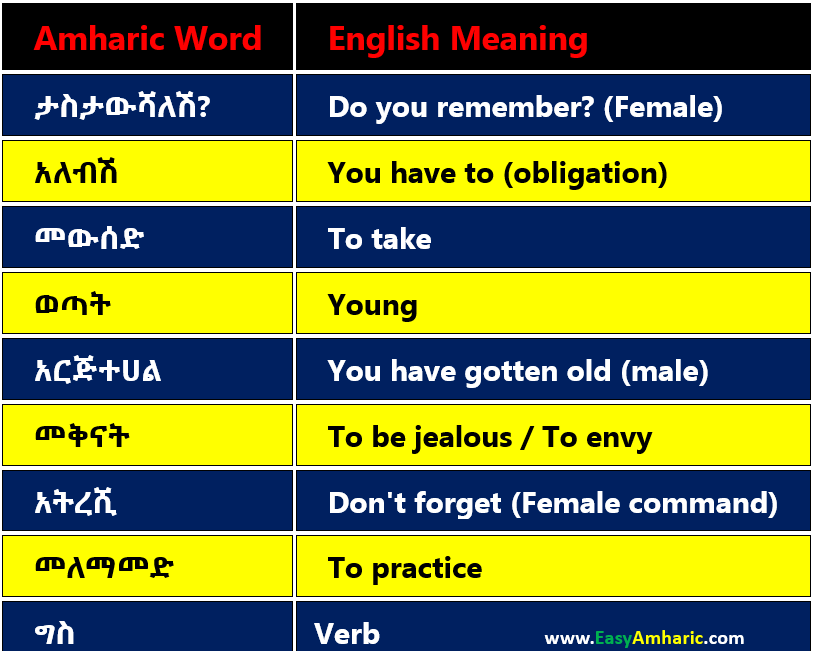
These notes include correct spelling, proper punctuation, and correct verb usage following gender (Masculine/Feminine).
Part 1: Questions and Obligation (Necessity)
Do you remember?
- Male: ታስታውሳለህ? (Tāstāwusāleh?)
- Female: ታስታውሻለሽ? (Tāstāwushālesh?)
You have to visit a doctor/clinic.
- Female: ሀኪም ቤት መሄድ አለብሽ። (Hākim bēt meḫēd ālebbish.)
You have to eat food.
- Male: ምግብ መብላት አለብህ። (Mgeb meblat ālebbeh.)
- Female: ምግብ መብላት አለብሽ።
- Male: መመገብ አለብህ። (Memmegeb ālebbeh.)
- Female: መመገብ አለብሽ።
You have to drink a lot of water.
- Male: ብዙ ውኃ መጠጣት አለብህ። (Bizu wehā meṭeṭāt ālebbeh.)
- Female: ብዙ ውኃ መጠጣት አለብሽ።
You should take plenty of fluids.
- Male: ብዙ ፈሳሽ መውሰድ አለብህ።
- Female: ብዙ ፈሳሽ መውሰድ አለብሽ።
He/She has to go.
- He: መሄድ አለበት። (Meḫēd ālebbāt.)
- She: መሄድ አለባት። (Meḫēd ālebbāt.)
You have to give birth / have a baby.
- Male: መውለድ አለብህ። You have to a baby.
- Female: መውለድ አለብሽ። You have to give birth.
You should have a baby.
- Female: ልጅ መውለድ አለብሽ።
Additional Notes (Part 1)
ያንተ ሚስት ስንት ዓመቷ ነው?– How old is your wife?እኔ 37 ዓመቴ ነው።– I am 37 years old.አሁን በፍጥነት ማርገዝ አለብሽ።– You (Fem.) have to get pregnant quickly now.መድኃኒት መውሰድ ማቆም አለብሽ።– You (Fem.) have to stop taking medicine.
Part 2: Age and Youth (Amharic Verb Form – Past Tense)
I have gotten old. / I am old.
- አርጅቻለሁ። (Ārjīčālehu.)
He has gotten old. / He is old.
- አርጅቷል። (Ārjiṭwāl.)
She has gotten old. / She is old.
- አርጅታለች። (Ārjiṭālech.)
You have gotten old. / You are old.
- Male: አርጅተሃል። (Ārjitehāl.)
- Female: አርጅተሻል። (Ārjiteshāl.)
Other Age-Related Vocabulary
- ማርጀት (Mārjeṭ) = to get old 🧓
- እያረጀሁ ነው። (Īyārejehu new.) = I am getting old.
- አረጀሁ። (Ārejehu.) = I got old.
- ወጣት ነኝ። (Weṭaṭ negn.) = I am young.
- ወጣት ነሽ። (Weṭaṭ nesh.) = You (Fem.) are young.
- አላረጀም። (Ālārejem.) = He/It is not old.
- ግራጫ (Grāčā) = Gray (Color)
- ሽበት (Shebet) = Gray hair (collective)
- ትንሽ የሸበተ ፀጉር አለኝ። (Tinish yeshebetse tsegur ālleñ.) = I have a little gray hair.
Part 3: Envy and Emotions
Verbs
- To be jealous / To envy (Infinitive): መቅናት (Meqnāt)
- They are jealous / They envy: ይቀናሉ (Yeqenālu)
- I am jealous / I envy: እቀናለሁ። (Eqenālehu.)
- It makes me jealous: ያስቀናኛል። (Yāsqenāñāl.)
- She makes me jealous: ታስቀናኛለች። (Tāsqenāñālech.)
- She is jealous of me: ትቀናብኛለች። (Teqenābbiñālech.)
Nouns & Other Emotions
- Envious/Jealous person: ምቀኛ (Meqeñā)
- To get angry: መቆጣት (Meqoṭāt)
- Examples: ተቆጣ (He got angry), ተቆጣች (She got angry), ተቆጣሁ (I got angry)
- To be annoyed / To be upset: መናደድ (Menāded)
- To be sad: ማዘን (Māzen)
- To worry: መጨነቅ (Mečeneq)
- To fear / To be afraid: መፍራት (Mefrāt)
Part 4: Remembering and Forgetting
Infinitives and Simple Tenses
- To remember (Infinitive): ማስታወስ (Māstāwus)
- To forget (Infinitive): መርሳት (Mersāt)
- I forgot it: ረሳሁት። (Resāhut.)
- I remember: አስታውሳለሁ። (Āstāwsālehu.)
Commands (Don’t Forget)
- Don’t forget (Male command): አትርሳ። (Ātirsā.)
- Don’t forget (Female command): አትረሺ። (Ātreshī.)
- Don’t forget what I told you (Male): የነገርኩህን አትርሳ። (Yenegerkuhen ātirssā.)
Reminder Phrases
- ዛሬ የቤት ሥራ መሥራት እንዳለብህ አስታውስ። Remember that you (Masc.) have to do homework today.
- ዛሬ የቤት ሥራ መሥራት እንዳለብሽ አስታውሺ። Remember that you (Fem.) have to do homework today.
- መድኃኒትሽን መውሰድ እንዳለብሽ አስታውሺ። Remember that you (Fem.) have to take your medicine.
Note / Sentiment / Recollection
- Note / Reminder / Notebook: ማስታወሻ (Māstāwesha)
- Memory (Recollection/Faculty): ትውስታ (Tiwustā)
- Memory (Nostalgia/Sentiment/Idiom for Missing): ትዝታ (Tiztā)
- Example:
ኢትዮጵያን በተመለከተ ጥሩ ትዝታ አለኝ።– I have good memories concerning Ethiopia. - Example:
ትዝታሽ አለብኝ።– I miss you (literally: Your memory is on me).
- Example:
Part 5: Miscellaneous Vocabulary
- She learned: ተማረች። (Temāreč.)
- Amharic (Language): አማርኛ (Āmāriññā)
- Reasons (Plural): ምክንያቶች (Mkeneyetoč)
- Because (Conjunction): ምክንያቱም (Mkeneyātum)
- The Bible: መጽሐፍ ቅዱስ (Meṣhāf Qiddūs)
- Jehovah’s Witness: የይሖዋ ምስክር (Ye-Yəhoåa məsəkkər)
- He goes/enters heaven: ወደ ገነት ይሄዳል። (Wede Gennet yīhēdāl.)
- That is a good question: ጥሩ ጥያቄ ነው። (Ṭiru ṭiyyāqē new.)
- Practicing is necessary/important: መለማመድ አስፈላጊ ነው። (Melemāmmed āssifelāggī new.)
- I will allocate time for practicing: ለመለማመድ ጊዜ እመድባለሁ። (Lemelmāmmed gīzē emedbālehu.)
- Allocate time (Fem.) and practice (Fem.): ጊዜ መድቢና ተለማመጂ። (Gīzē medbīnnā telemāmmejī.)
- What is verb in Amharic? በአማርኛ ቨርብ ምን ይባላል?
- It is called a verb: ግስ ይባላል። (Gis yibālāl.)
- You (Fem.) learned a lot of verbs today: ዛሬ ብዙ ግስ ተማርሽ። (Zārē bizu gis temārsh.) ተማርሽ is simple past.
- You have (Fem.) learned a lot of verbs today: ዛሬ ብዙ ግስ ተምረሻል ። (Zārē bizu gis temreshal.) ተምረሻል is present perfect.

